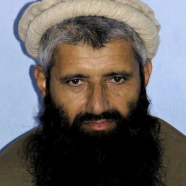Overview
Abdul Rahim Muslim Dost is an Afghan extremist, journalist, poet, and former Guantanamo Bay detainee. At the time of his capture in 2001, Dost was accused of engaging in terrorist activities with al-Qaeda and the Taliban.Delcan Walsh, “Return my work, says Guantánamo poet,” Guardian (London), April 3, 2006, http://www.theguardian.com/world/2006/apr/03/guantanamo.books. He was also a member of Jamaat ud Dawa il al Quran al Sunnat (JDQ), a religious school with a militant and assassination wing known to provide both religious and paramilitary training.“The Guantanamo Docket: Abdul Rahim Muslim Dost: Combatant Status Review Tribunals Summaries,” New York Times, accessed March 18, 2016, http://projects.nytimes.com/guantanamo/detainees/561-abdul-rahim-muslim-dost/documents/5. According to Dost’s own account, he was part of the group of extremists who violently stormed and besieged the Grand Mosque in Mecca, Saudi Arabia, in 1979.Thomas Joscelyn, “Gitmo ‘Poet’ Now Recruiting for Islamic State,” Weekly Standard, November 19, 2014, http://www.weeklystandard.com/article/gitmo-poet-now-recruiting-islamic-state/819587.
Dost was captured by Pakistani forces alongside his brother in November 2001 and later transferred to U.S. custody. Dost’s brother, Badr Zaman Badr, later suggested that the pair had been arrested on the basis of satire, telling American radio producers in 2007 that he and Dost had written a joke about a public official, who then told authorities the brothers were linked to al-Qaeda.Jennifer Fenton, “After repatriation, ex-Guantánamo Afghans pursue variety of life options,” Al Jazeera America, January 27, 2016, http://america.aljazeera.com/articles/2016/1/27/guantanamo-afghans-repatriation-life.html;
“331: Habeas Schmabeas 2007 Transcript,” This American Life, originally aired April 27, 2007, https://www.thisamericanlife.org/radio-archives/episode/331/habeas-schmabeas-2007. The pair was sent to Guantanamo Bay in early 2002.Delcan Walsh, “Return my work, says Guantánamo poet,” Guardian (London), April 3, 2006, http://www.theguardian.com/world/2006/apr/03/guantanamo.books. Also captured alongside Dost and transferred to Guantanamo was Dost’s brother, Badr Zaman Badr.Jennifer Fenton, “After repatriation, ex-Guantánamo Afghans pursue variety of life options,” Al Jazeera America, January 27, 2016, http://america.aljazeera.com/articles/2016/1/27/guantanamo-afghans-repatriation-life.html.
Dost was repatriated to Afghanistan in April 2005 due in large part to his failing health condition. The illnesses recorded in Dost’s medical file—including a history of diabetes and an enlarged thyroid gland—contributed to an assessment by the U.S. Department of Defense’s Joint Task Force Guantanamo (JTF) that Dost posed a low risk to the United States, its interests, and allies.“The Guantanamo Docket: Abdul Rahim Muslim Dost: JTF-GTMO Assessment,” New York Times, accessed March 9, 2016, 1, http://projects.nytimes.com/guantanamo/detainees/561-abdul-rahim-muslim-dost/documents/11.
Following his release from Guantanamo, in 2006 Dost published “The Broken Chains,” an account of his experience in detention. In 2007, Dost’s poems were included in a volume of poems written by Guantanamo detainees called Poems from Guantánamo: the Detainees Speak, a collection that was edited by Marc Falcoff and published by University of Iowa Press in 2007.“Poems from Guantánamo,” University of Iowa Press, accessed March 18, 2016, http://www.uiowapress.org/books/2007-fall/falpoefro.html. Dost was arrested by Pakistani officials in 2006, a year before the release of Poems from Guantánamo. In 2008, he was released as part of a prisoner exchange with the Taliban. Thomas Joscelyn, “Gitmo ‘Poet’ Now Recruiting for Islamic State,” Weekly Standard, November 19, 2014, http://www.weeklystandard.com/article/gitmo-poet-now-recruiting-islamic-state/819587.
On July 1, 2014, Dost defected from the Taliban and swore allegiance to ISIS leader Abu Bakr al-Baghdadi, a mere two days following the terror group’s declaration of a caliphate.Thomas Joscelyn, “Gitmo ‘Poet’ Now Recruiting for Islamic State,” Weekly Standard, November 19, 2014, http://www.weeklystandard.com/article/gitmo-poet-now-recruiting-islamic-state/819587. Dost is believed to work as key ISIS commander and recruiter in the Afghan-Pakistan region.“Released Gitmo detainee joins ISIS,” Fox News, November 19, 2014, http://video.foxnews.com/v/3899320881001/released-gitmo-detainee-joins-isis;
“Life after Guantanamo: A tale of two Afghan friends,” Express Tribune (Karachi), February 27, 2017, https://tribune.com.pk/story/1340361/life-guantanamo-tale-two-afghan-friends/;
Bill Roggio, “Ex-Gitmo ‘poet’ and committed jihadist denounces Islamic State for attacks on civilians,” Long War Journal, July 30, 2016, http://www.longwarjournal.org/archives/2016/07/ex-gitmo-poet-and-committed-jihadist-denounces-islamic-state-for-attacks-on-civilians.php. His recruiting campaign for the terrorist group reportedly includes both pamphleteering as well as a graffiti project, which aims to plaster pro-ISIS messages throughout northern Pakistan.Thomas Joscelyn, “Gitmo ‘Poet’ Now Recruiting for Islamic State,” Weekly Standard, November 19, 2014, http://www.weeklystandard.com/article/gitmo-poet-now-recruiting-islamic-state/819587;
Zahir Shah Sherazi, “Islamic State footprints surface in parts of Bannu,” Dawn (Karachi), November 14, 2014, http://www.dawn.com/news/1144256/islamic-state-footprints-surface-in-parts-of-bannu.
According to some sources, Dost defected from ISIS at some point in 2015, and subsequently denounced the group’s wanton killing of civilians in Afghanistan.Bill Roggio, “Ex-Gitmo ‘poet’ and committed jihadist denounces Islamic State for attacks on civilians,” Long War Journal, July 30, 2016, http://www.longwarjournal.org/archives/2016/07/ex-gitmo-poet-and-committed-jihadist-denounces-islamic-state-for-attacks-on-civilians.php. Other sources have continued to referr to Dost as a top ISIS commander in eastern Nangarhar province.“Life after Guantanamo: A tale of two Afghan friends,” Express Tribune (Karachi), February 27, 2017, https://tribune.com.pk/story/1340361/life-guantanamo-tale-two-afghan-friends/.
Associated Groups
- Extremist entity
- Taliban
- Read Threat Report
- Type(s) of Organization:
- Insurgent, regional, terrorist, transnational, violent
- Ideologies and Affiliations:
- Deobandi, Islamist, jihadist, Pashtun, Salafi, Sunni, Wahhabi
- Position(s):
- Commander (alleged)
The Taliban seized power in Afghanistan in August 2021 after previously leading a violent insurgency in Afghanistan and Pakistan. The group is closely affiliated with al-Qaeda.
- Extremist entity
- Al-Qaeda
- Read Threat Report
- Type(s) of Organization:
- Non-state actor, religious, terrorist, transnational, violent
- Ideologies and Affiliations:
- Jihadist, pan-Islamist, Qutbist, Salafist, Sunni, takfiri
- Position(s):
- Representative in Herat, Afghanistan (alleged)
- Extremist entity
- ISIS
- Read Threat Report
- Type(s) of Organization:
- Insurgent, territory-controlling, religious, terrorist, violent
- Ideologies and Affiliations:
- Islamist, jihadist, pan-Islamist, Salafist, takfiri
- Position(s):
- Recruiter, ISIS chief in the Khorasan region
